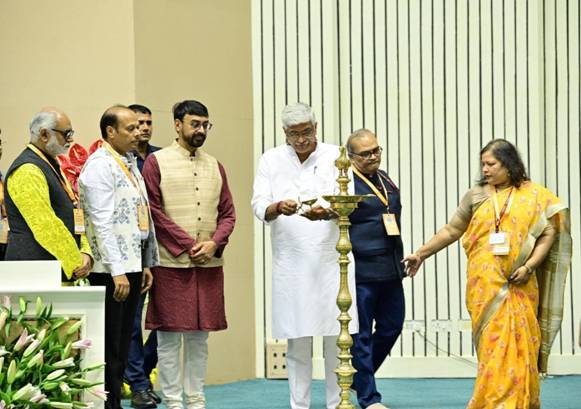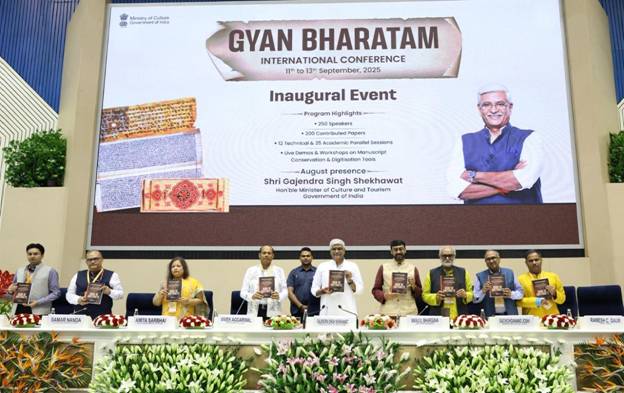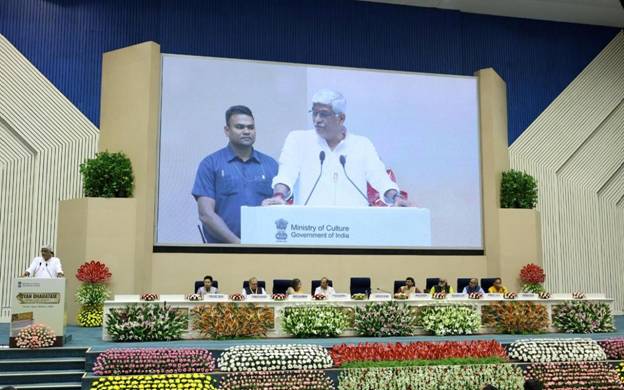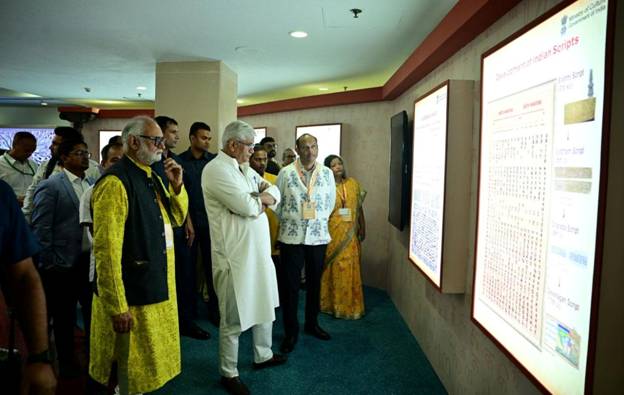Ministry of Culture
India’s rich knowledge tradition is being reintroduced to the Nation and the world through a Cultural Renaissance: Shri Gajendra Singh Shekhawat
Gyan Bharatam International Conference on India’s Knowledge Legacy Begins in New Delhi
Posted On:
11 SEP 2025 8:46PM by PIB Delhi
The Ministry of Culture launched the ‘Gyan Bharatam’, a landmark national initiative dedicated to preserving, digitising, and disseminating India’s manuscript heritage. To mark this occasion, the Ministry organised the first-ever Gyan Bharatam International Conference on ‘Reclaiming India’s Knowledge Legacy through Manuscript Heritage’ from 11th-13th September 2025 at Vigyan Bhawan, New Delhi. Bringing together over 1,100 participants including scholars, experts, institutions, and cultural practitioners from India and abroad, the conference has created a collaborative platform for discussion, deliberation, and charting the way forward in preserving, digitising, and sharing India’s manuscript wealth with the world. The Hon’ble Prime Minister will attend the conference on 12th September to listen to the presentations of the working groups and will address the gathering thereafter. The three-day deliberations will conclude with the valedictory session on 13th September, which will be chaired by the Home Minister of India.

The inaugural session was graced by Shri Gajendra Singh Shekhawat, Minister for Culture, as the Chief Guest. The session was also attended by eminent dignitaries including Shri Vivek Agarwal, Secretary, Ministry of Culture; Prof. Manjul Bhargava, Fields Medal awardee and Professor at Princeton University; Smt. Amita Prasad Sarbhai, Additional Secretary, Ministry of Culture; Shri Samar Nanda, Joint Secretary, Ministry of Culture; Shri Inderjeet Singh, Director, Ministry of Culture; Dr. Sachchidanand Joshi, Member Secretary, IGNCA; Prof. Ramesh Chandra Gaur, Dean (Administration) and Head, Kalanidhi Division, IGNCA; and Prof. (Dr.) Anirban Dash, Director, National Mission on Manuscripts. In his introductory welcome address, Shri Vivek Agarwal set the tone for the deliberations. Prof. Manjul Bhargava, delivered the keynote address, highlighting the significance of India’s manuscript tradition and its role in advancing global knowledge systems.

Speaking on the occasion, Shri Gajendra Singh Shekhawat, Minister for Culture, said that India’s rich knowledge tradition, which has endured for thousands of years despite challenges, struggles, and invasions, is now being reintroduced to the nation and the world through the Gyan Bharatam Mission launched under the leadership of Prime Minister Narendra Modi. He observed that true pride arises only when people know, recognise, and connect with their own civilisational wealth, and this mission seeks to make that possible by reviving manuscripts through digitisation, translation, and technological innovation. Thousands of years ago, our sages and seers, through their discussions, experiences, and realisations, created texts that remain as relevant to the world today as they were when they were composed. These texts, based on deep study of core subjects related to human life, continue to hold undiminished significance even after millennia—for humanity, for the environment, and for the entire ecosystem.

Stressing that this cultural renaissance cannot be achieved merely through lectures or events, he underlined the need for collective responsibility in safeguarding and celebrating this legacy so that it becomes a matter of pride for every Indian. He further emphasised the creation of a National Repository, clusters, and centres of excellence across the country, and acknowledged the efforts of institutions, universities, and individuals who have preserved manuscripts despite adversities, calling them true custodians of a treasure that belongs not only to India but to all of humanity. Recalling that the National Mission on Manuscripts had first been initiated during the tenure of Shri Atal Bihari Vajpayee, he noted that while some cataloguing and identification work had been undertaken then, the effort had come to a standstill in subsequent years. He expressed confidence that the yajna that has now recommenced will undoubtedly succeed, and urged all to deliberate on how the envisioned National Repository could be further enriched and expanded in scope.

Prof. (Dr.) Manjul Bhargava, during his keynote speech, stated that India, with over ten million manuscripts, perhaps holds the richest reservoir of classical and local traditions. These texts embody literature, science, mathematics, philosophy, and art in deeply interdisciplinary ways. He emphasised that a thoughtful revival of this tradition can inspire national pride, strengthen education, enhance cultural diplomacy, empower communities, promote sustainable development, and catalyse new research. In short, such a movement can spark nothing less than an Indian Renaissance. He added that as the Gyan Bharatam Mission begins, it must be seen not merely as preservation but also as creation—reviving India’s classical and local knowledge systems to inspire future generations.
Shri Vivek Agarwal, in his introductory address, said that it is a great responsibility and duty to preserve and safeguard India’s traditions, its ancient culture, and its tangible and intangible cultural heritage, and to present it before future generations. The lessons drawn from this heritage must be carried forward to the younger generations. He recalled that during the World Parliament of Religions, when someone asked, “You worship idols?” Swami Vivekananda replied, “We don’t worship idols, we worship the ideal behind the idol.” Referring to this statement, he said that in the same way, we do not look at a manuscript as a mere object, but as a repository of knowledge. He further added that the deliberations held during this conference will form the roadmap for the future course of the ‘Gyan Bharatam’ Mission.
Dr. Sachchidanand Joshi, while co-chairing a session on the theme ‘Repatriation of Indian Manuscripts – Preserving Heritage, Restoring Identity’, said that repatriation is important, but the first task is to map where these manuscripts actually are. Even today, we do not have an exact record of the ten million manuscripts said to exist in Bharat, nor of the nearly one million lying abroad in countries such as France, Germany, the United Kingdom, Denmark, Sweden, the Netherlands, and even in the Hermitage Museum. He stressed that the immediate step must be to identify, catalogue, and secure digitised copies, so that the vast treasure of knowledge they hold can be studied, preserved, and eventually brought back to Bharat.
Throughout the day, parallel sessions were held on themes such as Manuscriptology and Paleography; Survey, Documentation, Metadata, Digitisation Tools, Platforms, and Protocols (HTR, AI, IIF) Standards and Digital Archiving; Safeguarding Manuscript Heritage: National and International Perspective; Conservation and Restoration of Manuscripts, among others. The sessions featured eminent names including Prof. Ramesh Kumar Pandey, Former Vice-Chancellor, Shri Lal Bahadur Shastri National Sanskrit University; Prof. Sachin Chaturvedi, Vice-Chancellor, Nalanda University; Prof. Bihari Lal Sharma, Vice-Chancellor, Sampurnananda Sanskrit University, Uttar Pradesh; Dr. Padma Subrahmanyam, Trustee, IGNCA, along with several other distinguished speakers and scholars. At the end of the inaugural session a formal vote of thanks was delivered by Shri Samar Nanda.
***
Sunil Kumar Tiwari
pibculture[at]gmail[dot]com
(Release ID: 2165829)
Visitor Counter : 551